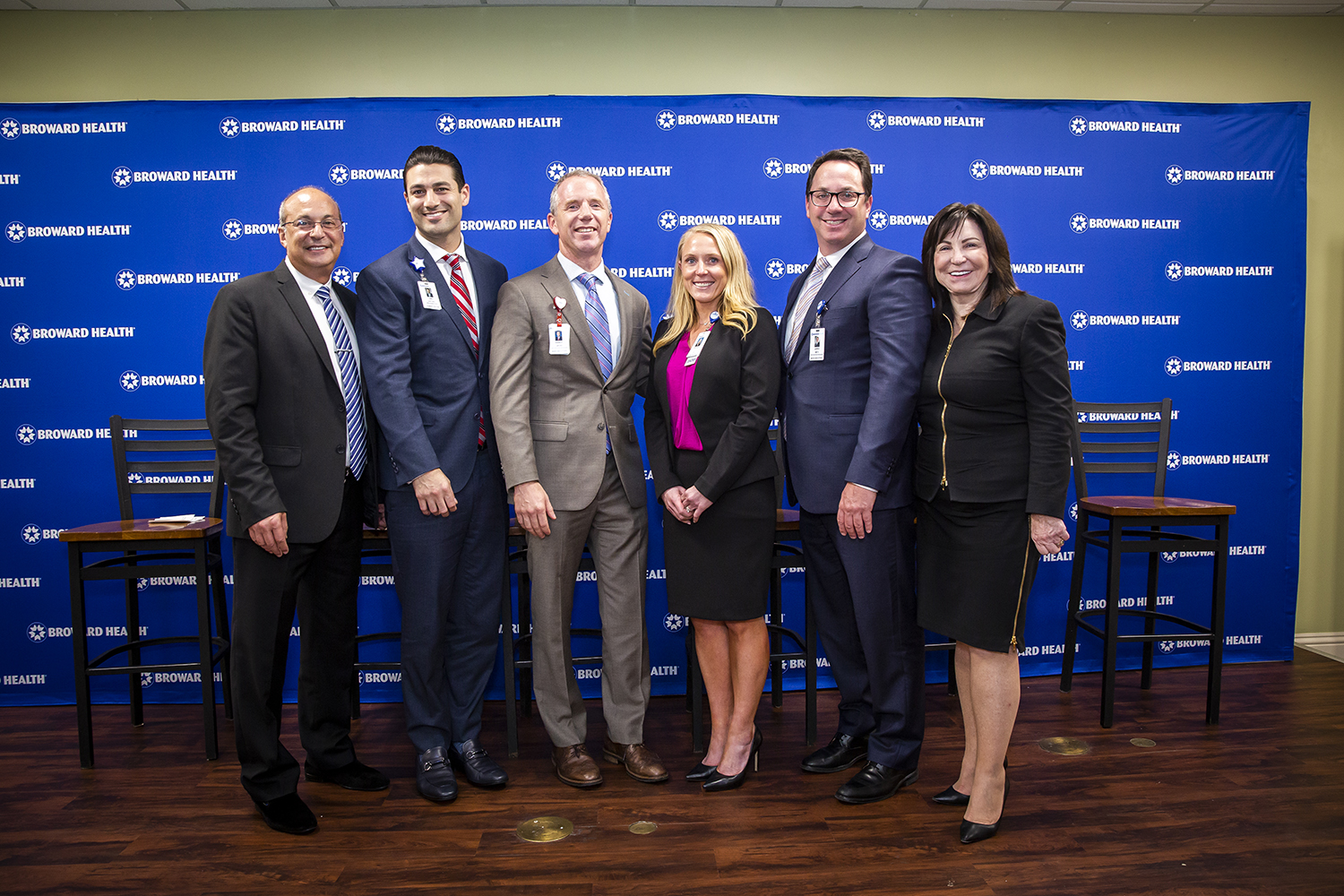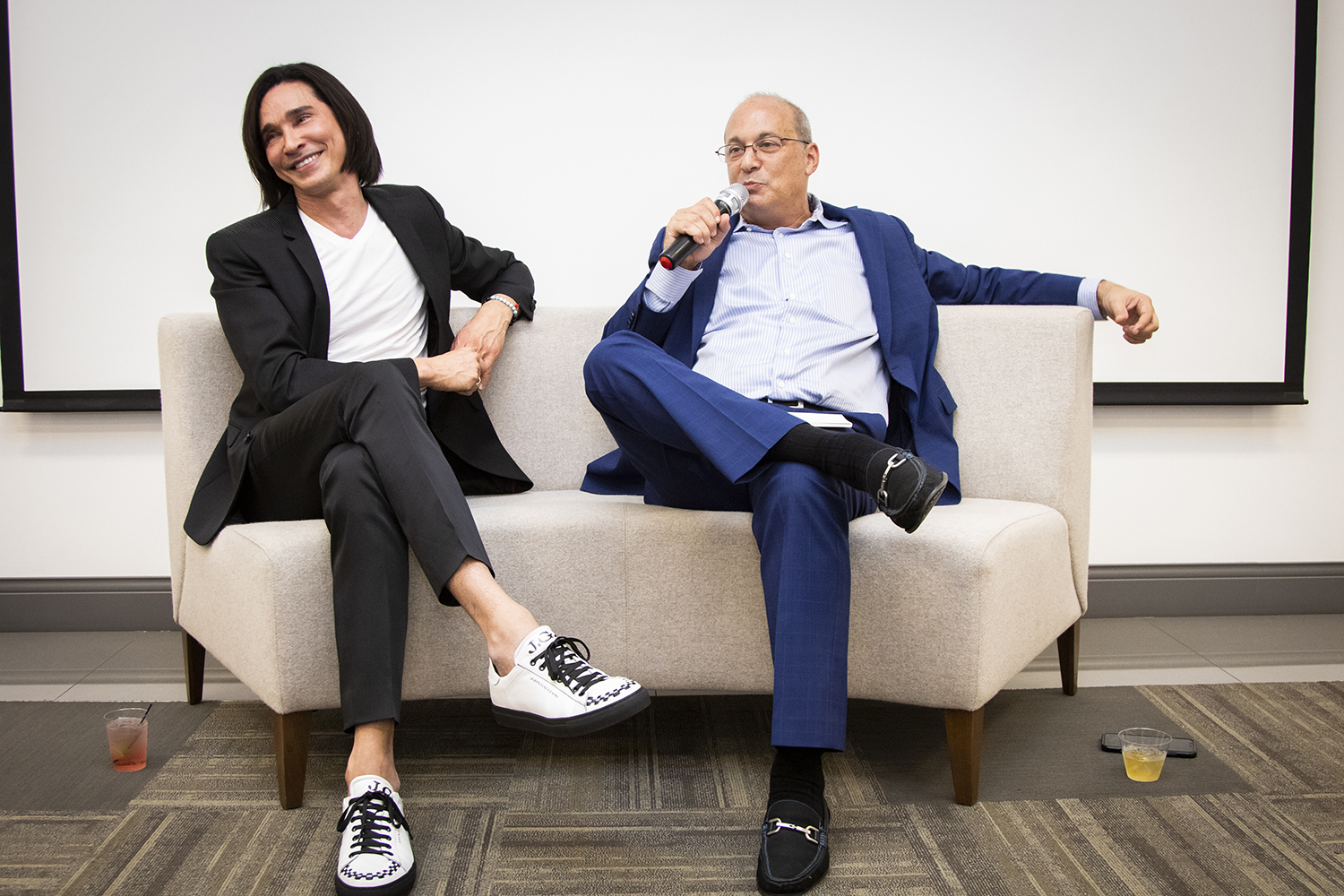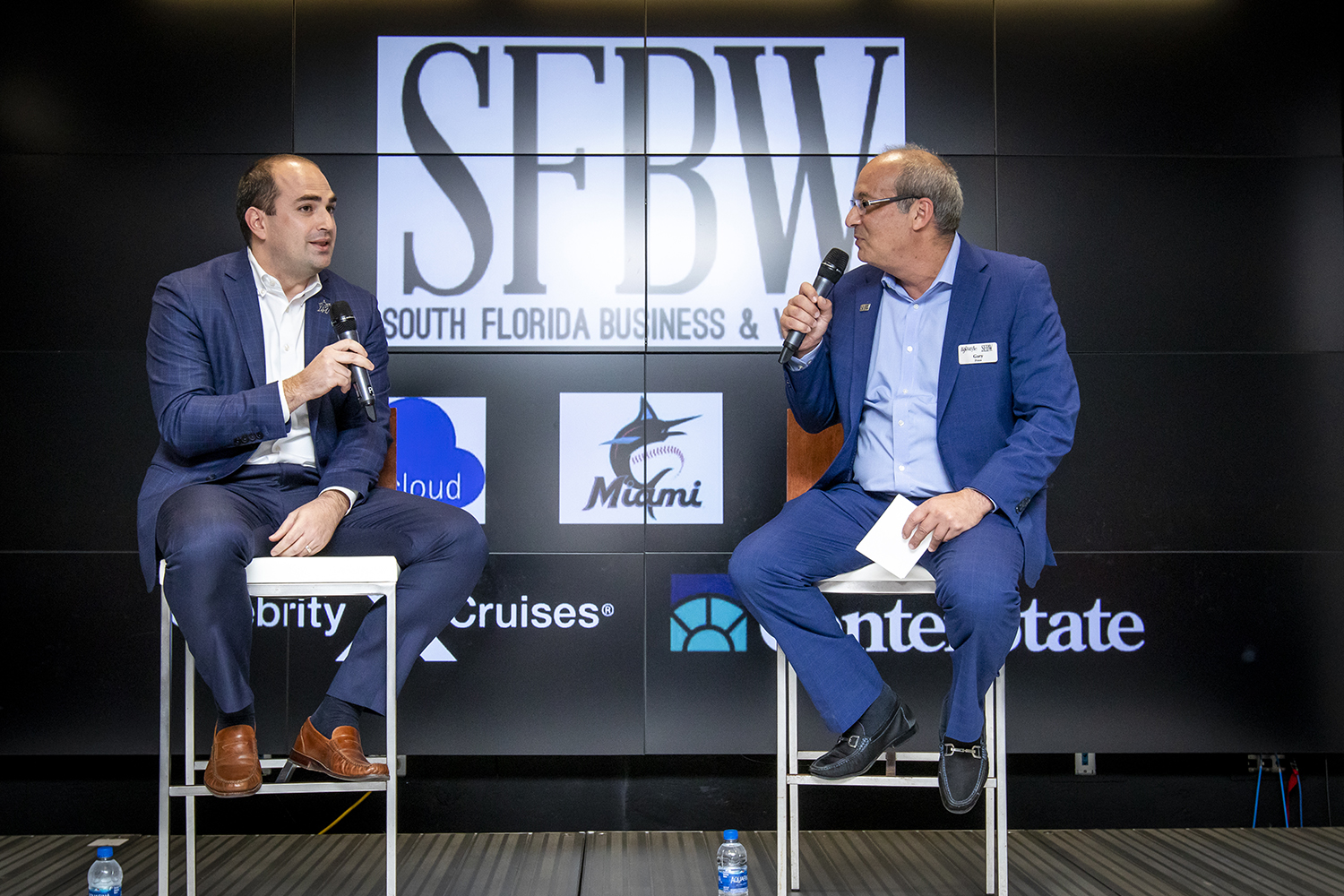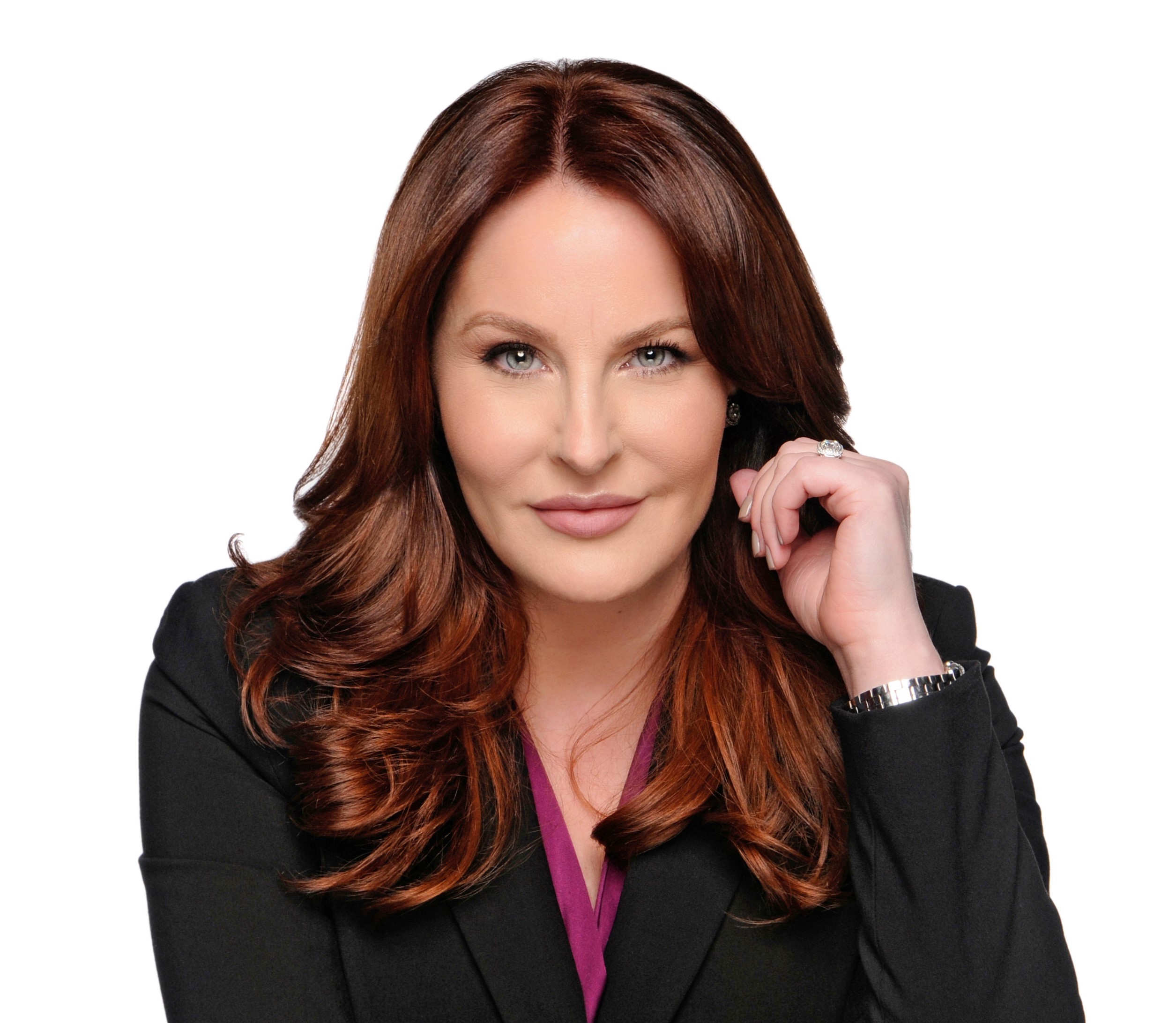Looking for reform? Ask a doctor who’s a hospital CEO
Dr. Patrick Taylor has his hands full with the evolving world of health care as president and CEO of Holy Cross Hospital, a full-service hospital in Fort Lauderdale that has 557 beds and 600 doctors.
Taylor joined Holy Cross in 1988 as an emergency physician. He became medical director of the emergency department in 1990 while also serving as executive director of medical affairs for the Holy Cross Medical Group. He was promoted to vice president of the medical group in 1999 and implemented a turnaround strategy. He became senior vice president of Holy Cross in 2002, COO in 2006 and assumed his current positions in 2010.
Taylor received his undergraduate degree from the University of Notre Dame and his medical degree from Duke University, and is involved in the community as a board member of Jack and Jill Children’s Center, the Broward Partnership for the Homeless and the Broward Workshop.
He has been recognized with a Valor Award and named Father of the Year by the American Diabetes Association, and a Leader of the Year award from the Leadership Broward Foundation.
Taylor was interviewed by SFBW Chairman and CEO Gary Press at the sales center for the Riva luxury condominium in Fort Lauderdale. The presenting sponsor was Celebrity Cruises and the other sponsors were Greenspoon Marder, TD Bank, Shorecrest Construction and Optime Partners.
The following transcript has been edited for brevity and clarity.
This seems like a period of uncertainty for the future of health care, with Congress recently deliberating over a replacement for the Affordable Care Act. What do you think should be done, and why?
The bill that was before the House was not supported by any health care association, including the American Medical Association, the American Hospital Association and the physicians. When you are in health care, it’s very hard to support an initiative that is going to cover fewer patients with insurance. At the end of the day, having health care insurance is just so vital now.
How do I know that? Every week somebody will call me. Most of us have great insurance, but they call me and some major unfortunate medical issue has come before them. They are asking me to help navigate our health care system and they are also scared at times financially.
I can’t imagine what it feels like for someone with no health care insurance having a medical problem. I would tell you that we, the health care system, would like to see everybody covered—not necessarily a universal health care plan.
Ultimately, one way or the other it is going to get paid for. Currently, the law of the land says if a patient walks into emergency department, every hospital must see and treat the patient. We’re going to treat that patient as part of our core mission. That’s part of our charity and part of what we give back. But ultimately the cost of that care gets passed along.
As a hospital, we have to maintain a 1 to 3 percent margin to continue to reinvest in the community. So that cost is going to get passed along to those who are insured, get passed on when we negotiate with a managed care company. Then it gets passed on to you as a businessperson.
So, we are going to pay for it one way or the other. You might as well try to pay for it up front.
Even though I’m an emergency room physician, that’s not the best place to get your primary care. You are going to get some of the most highly specialized people with some of the highest-end technology for primary care. That’s very expensive. This is not the best way to provide episodic care.
Was “Obamacare” a bad first step, or do you think it was a good first step that we need to build upon?
I don’t think it was terminally flawed. I think it had flaws. If you are the insurance company, you can’t just let in the sickest of the sickest and not have the healthy. To share risk, you have to have healthy [people] in the pool and those who are not so healthy and those who are very sick. That’s the part that we didn’t quite get right in Obamacare.
I think the other part—and it’s not just Obama, it’s been going on through multiple administrations—[is that] nobody negotiates with the drug companies. Even Medicare does not negotiate with drug companies. The drug companies are totally free-market. You want to talk about double-, triple-digit increases year over year and the cost of drugs that even folks in this room can’t afford? I do think our federal government should negotiate with the drug companies.
I think the Republican bill, which was withdrawn in March, didn’t deal with tort reform or negotiate with the major pharmaceutical companies.
It [did] not deal with “Big Pharma” or tort reform or malpractice. I’m not going to tell you we don’t make errors. Hospitals are built on human beings. We don’t all follow the textbook in medicine. Having practiced medicine for decades, when I have a friend or family member or a colleague, I always say, ‘I’m going to treat you like family.’ That doesn’t mean any better. I’m probably going to do a little less testing on you, use a lot more of clinical judgment and not rely on high-end testing.
When you are in an emergency department and you are an emergency physician, you have to practice a bit of defensive medicine. That’s not what I like. Most physicians don’t like to practice defensive medicine. That drives up costs tremendously.
Tell me about the initiatives you are taking as president and CEO.
Over the last several years, we have transitioned from what I thought was a very good community hospital to a teaching hospital working with the University of Miami. We have 18 new residents each year in internal medicine. We are also partners with UM and Jackson Health [System] to develop an emergency medical residency program.
Why is that important? First of all, where physicians train is often where they are going to stay and practice, so that puts new physicians into this community—and that’s a good thing for us. The other reason is when you have to teach something, it really elevates your game. Students always ask that tough question, “Why?” It raises the bar in a hospital—it raises the quality, the standard.
Another thing we are working on is population health. I use an analogy: Imagine you are a company and what you do is you repair high-end automobiles very well when they are in accidents. All of the sudden, somebody comes up and says, “You do that very well, but you know what? What we need you to do tomorrow is prevent accidents.” What do you know about preventing accidents? You’ve seen a lot of them, but how to prevent them is really something you have never taught yourself. That’s kind of what has happened with health care. We built a system of health care in the U.S. of fixing people when they got sick. Now, we are being asked to keep a population healthy. So that’s a whole new skill set that we are trying to learn.
[Editor’s note: Under new federal rules, health care organizations that receive payments through Medicare are scored on the overall wellness of specific communities — population health — as one of several criteria tied to compensation.]
We are putting in initiatives so you do the right things—you exercise and eat the right things. You do all of that preventive care. If you are ill, we get you to the most appropriate place and also the least level of intensity you need. Don’t come to the emergency department—did you see your primary care doctor? If it’s the weekend, go to an urgent care center unless it’s a true emergency. Education, how to do that, that’s a major shift we are going through.
What is the state of health care in South Florida? What are our strengths and weaknesses?
South Florida has some wonderful health care. I’m biased, but one of those is Holy Cross. We have some premiere health care in South Florida. I know that because, every day, some of our patients may get a diagnosis and have the means to fly to some of the best names in the nation, whether it be MD Anderson [Cancer Center in Houston], [Memorial] Sloan Kettering [Cancer Center in New York] or Massachusetts General [in Boston]. They come back and they say, “You know, your treatment plan is exactly what they said I should do.” If you need top-level health care, there is really no reason to leave South Florida.
The challenges or weaknesses is some of what is happening on a national basis. A large percentage of the population doesn’t have health care insurance. On top of that, we have a large population that is undocumented. That presents a whole other challenge to health care institutions. They are often scared of coming to health care institutions. They are afraid of getting turned in. It isn’t the case.
Second of all, not many health care institutions in the tri-county area, beyond the emergency department, will take care of those folks. So they may come into the emergency department, short of breath with a cough, and get a chest X-ray. Unfortunately, you have a tumor or something in your lung. You may get diagnosed and sent back out, because that’s not an emergency that requires immediate hospitalization. Not too many hospitals will follow up and treat that patient. Holy Cross—as part of who we are, part of our mission, our Catholic heritage—doesn’t turn anybody away.
What has been the financial trend for Holy Cross during the past few years?
Financially, it has been a challenge for most of the most major institutions in the nation. We are shifting from institutions that treat illness to [those that promote] wellness, but the payment model hasn’t shifted with us. We still get paid to treat illness, not wellness. Last year at Holy Cross, we were a little bit below break-even. This year, it is trending up again.
One of your main competitors, the North Broward Hospital District, has so many legal and management issues that a draft audit report says there is a significant business risk to the organization. What are your thoughts on what went wrong and what needs to be done to
fix it?
Most people would guess that they are a competitor, but I’m also a resident of north Broward County, so my taxes support that institution as well. I would say it’s very sad and disappointing. Certainly, even a great institution can stub their foot. We know that. But the series of things I read in the paper is disappointing. After a series of those types of events, you really have to really refocus on what’s your purpose, what’s your mission and what’s your values.
It ultimately comes down to board, culture and leadership. I think it’s true for any institution, the board kind of sets the guideposts and then you have to let management execute. In any institution, if a board gets involved in day-to-day operations, that’s not a good recipe. I am fortunate to have a superb board that sets guideposts and lets me and my senior team execute on a daily basis.
As more states are passing medical marijuana laws, do you have any thoughts? Is this a good idea? A bad idea?
If you ask physicians, we are probably split 50/50 on this issue. Some physicians feel it is not necessary as another tool. Some feel, and certainly in some extreme cases, it does bring comfort to somebody in a cancer situation or something of that nature—no harm. I have no problem providing it when appropriate to a patient.
I think what most physicians are concerned about is, we don’t want to get tied in or roped into prescribing marijuana for someone we really don’t think fits that, and we are going to be labeled as withholding something.
There is a growing abundance of information on the internet for health care consumers these days, and you have received some top ratings from U.S. News and World Report. What’s your strategy as far as transparency, improving rankings and responding to any critiques?
We do not go out to get any of those rankings or to target them. Our focus on a day-to-day basis is quality. Quality means decreasing variation. The more we decrease variation, the better safety we have. We focus on that religiously, no pun intended. If you decrease variation and you focus on quality and focus on safety, hopefully, some of the rankings come with them.
You talked about the transition from treating illness to promoting wellness. What are one or two ways we can help Holy Cross or get involved?
We go out and speak with employers all the time. One of the questions we get is, “How do we decrease health care costs?”
At Holy Cross, our associates stay with us 30, 40, 50 years. We are self-insured. I walked in and I said we aren’t going to have bacon in the cafeteria. We don’t have any Cokes in our vending machines.
Every day, there’s a healthy meal. If you buy the chicken and broccoli, it is dirt cheap. We subsidize the chicken and broccoli. If you want the burger and fries—it’s full freight.
I’m not trying to dictate your life, but you put incentives and tell them what to do and how to do the preventive things and why you should do that. So, there are programs you can structure, even in small companies, that will help your health care costs in the long run.↵








South Florida Business & Wealth’s CEO Connect series is an exclusive, invitation only monthly event that brings together South Florida’s top business leaders to meet, mingle and talk amongst their peers. Presenting Sponsor is Celebrity Cruises, Gold Sponsors include Greenspoon Marder, Shorecrest Construction, TD Bank, Optime Consulting and RIVA Luxury Condominium. The evening begins with a cocktail reception for about 100 guests followed by the highlight of the event, a live interview between Gary Press, Chairman & CEO of SFBW and a prestigious C-Level Executive providing insight into their personal lives, careers and views on issues affecting the business community. Partnering with SFBW on this exclusive event will provide the opportunity to network with the area’s business elite, generate new business opportunities and increase brand awareness in the community. For more information about event sponsorship opportunities, please contact Clayton Idle atcidle@sfbwmag.com.
















